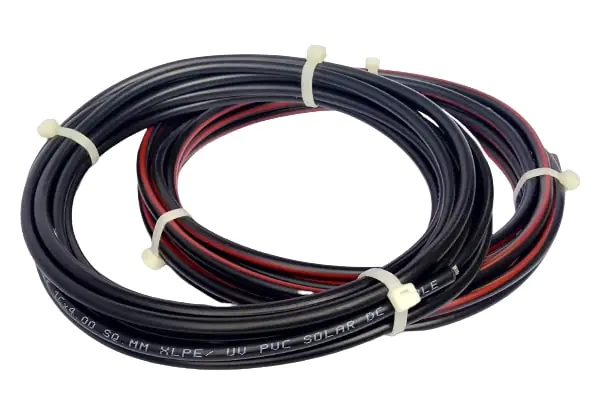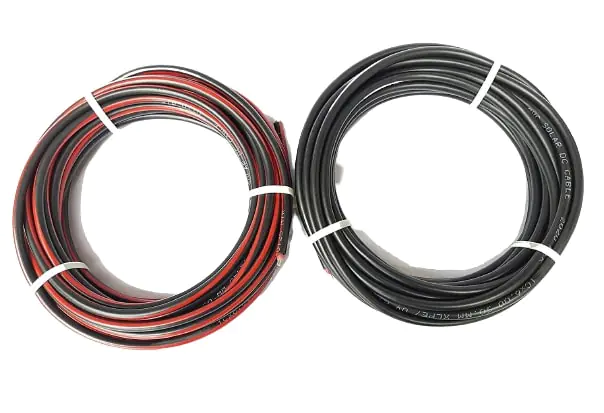High-Quality Solar DC Wire: Efficient and Reliable Connectivity
Solar DC Wire: An Overview
Solar DC Wire, also known as Photovoltaic (PV) wire, is a specially designed cable used for the interconnection of solar panels, inverters, and other system components in solar power systems. These wires are built to withstand the unique conditions and demands of solar installations, ensuring reliable and efficient energy transfer.

Why Choose Solar DC Wires?
Choosing the right Solar DC Wire for your solar system is crucial for several reasons:
- Safety: Solar DC Wires are designed with safety in mind. They have insulation and shielding properties that protect against electrical shock hazards and ensure safe operation.
- Efficiency: Solar DC Wires are designed to minimize power loss during energy transfer, optimizing the performance of the solar system.
- Durability: These wires are constructed using high-quality materials that can withstand outdoor conditions, including exposure to sunlight, temperature fluctuations, and moisture.
- Longevity: Solar DC Wires are built to last for many years, providing reliable performance and minimizing maintenance needs.
- Compliance: Using Solar DC Wires that meet relevant industry standards and codes ensures compliance with safety regulations and requirements.
Price List of Solar DC Wire
| Wire Model | Selling Price | Buy It Now |
| 4 Sq. MM Solar Wire (10M Red + 10M Black) | Rs. 1,399 |  |
| 6 Sq. MM Solar Wire (10M Red + 10M Black) | Rs. 1,799 |  |
| 10 Sq. MM Solar Wire (10M Red + 10M Black) | Rs. 3,499 |  |
Understanding Solar DC Wire Construction
Solar DC Wires are constructed with specific features to meet the unique needs of solar power systems:
- Conductor: The conductor of a Solar DC Wire is typically made of stranded copper. Copper offers excellent conductivity and is highly resistant to corrosion.
- Insulation: Solar DC Wires have a thick insulation layer made of cross-linked polyethylene (XLPE) or polyvinyl fluoride (PVDF). This insulation provides electrical insulation and protection against environmental factors.
- Shielding: Some Solar DC Wires come with an additional shielding layer, such as a foil or braided shield. This shielding minimizes electromagnetic interference (EMI) and ensures signal integrity.
- Jacket: The outer jacket of Solar DC Wires provides protection against mechanical stress, UV radiation, and moisture. It is usually made of materials like polyvinyl chloride (PVC) or cross-linked polyethylene (XLPE).
Types of Solar DC Wires
Several types of Solar DC Wires are available, each with specific characteristics and applications. Here are some common types:
Photovoltaic (PV) Wire
PV Wires are the most commonly used Solar DC Wires. They are designed for outdoor use in photovoltaic systems and comply with industry standards, such as UL 4703. PV Wires are available in various sizes and are suitable for both residential and commercial solar installations.
2. USE-2 Wire
USE-2 (Underground Service Entrance) Wires are specifically designed for underground applications. They have a thicker insulation layer and are often used for long-distance wiring between solar arrays and inverters.

3. THWN-2 Wire
THWN-2 (Thermoplastic Heat and Water-resistant Nylon-coated) Wires are versatile wires commonly used in electrical applications. They can also be used in solar systems where the wires need to be routed through conduits or indoors.
4. RHW-2 Wire
RHW-2 (Rubber- or Thermoset-Insulated Heat and Water-resistant) Wires are heavy-duty wires suitable for both outdoor and indoor solar applications. They have excellent resistance to heat, moisture, and sunlight exposure.
When selecting a Solar DC Wire, consult with a professional or refer to the manufacturer's guidelines to ensure the wire's suitability for your specific solar system requirements.
How to Install Solar DC Wires?
The installation of Solar DC Wires should be done by qualified professionals to ensure compliance with safety standards and optimal system performance. However, here is a general overview of the installation process:
- Planning: Assess the wiring requirements of your solar system and plan the routing of the wires. Consider factors such as wire length, voltage drop, and conduit requirements.
- Prepare the wires: Measure and cut the Solar DC Wires to the appropriate lengths, leaving some extra length for flexibility during installation.
- Connect the wires: Terminate the Solar DC Wires with appropriate connectors, such as MC4 connectors, to ensure secure and reliable connections.
- Route the wires: Carefully route the wires from the solar panels to the desired connection points, such as the combiner box or inverter.
- Secure the wires: Use appropriate clamps, ties, or conduit to secure the Solar DC Wires and protect them from mechanical stress and environmental factors.
- Test the connections: After the installation, perform thorough testing to ensure proper wiring connections and verify system functionality.
Remember, it is important to follow local electrical codes, regulations, and manufacturer instructions during the installation process.
Safety Considerations for Solar DC Wire Installation
Safety should always be a top priority during the installation of Solar DC Wires. Here are some safety considerations to keep in mind:
- Disconnecting power: Before starting any work, ensure that the solar panels and related equipment are disconnected from the power source to prevent electric shock hazards.
- Proper grounding: Follow proper grounding practices to minimize the risk of electrical faults and ensure system safety.
- Personal protective equipment: Wear appropriate personal protective equipment (PPE), such as gloves and safety glasses, to protect against potential hazards during the installation process.
- Adhering to regulations: Always adhere to local electrical codes, regulations, and guidelines to ensure compliance with safety standards and requirements.
If you are unsure about any aspect of the installation process or have concerns about safety, consult with a certified electrician or solar professional.
